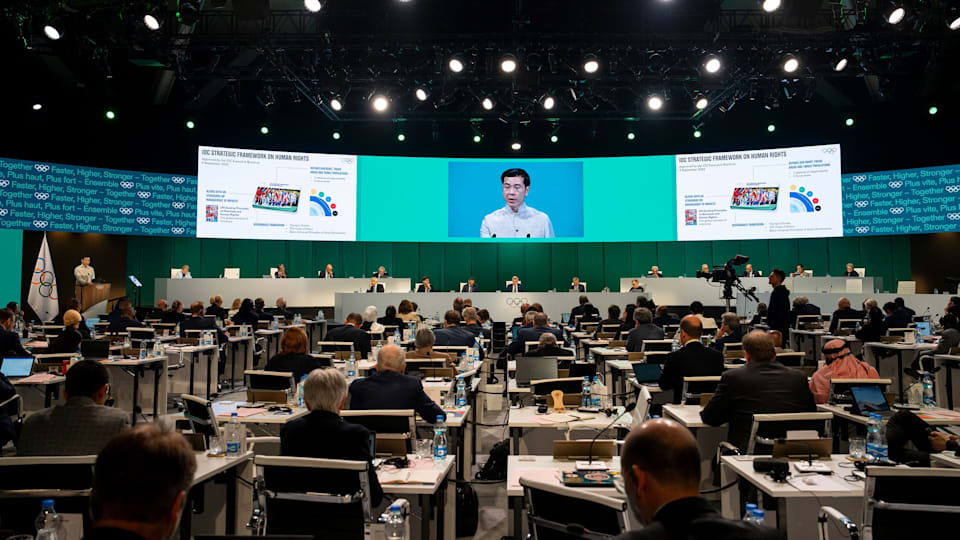First report by IOC Advisory Committee on Human Rights to the IOC Session
On its first day of meetings in Mumbai, India, the 141st Session of the International Olympic Committee (IOC) received the first report from the newly created IOC Advisory Committee on Human Rights.

The report was presented by Dr Seree Nonthasoot, a member of the Advisory Committee, on behalf of the Chair, Dr Phumzile Mlambo-Ngcuka. The Committee is made up of 10 members: the majority are independent external experts and four are IOC Members, including two athletes, collectively representing all continents, with the majority being women.
Dr Nonthasoot updated the IOC Members on the progress made in the year since the IOC’s Strategic Framework on Human Rights was approved by the IOC Executive Board (EB) soon after the 139th IOC Session. The highlights were as follows:
- The composition of the IOC Advisory Committee on Human Rights was finalised in December 2022 and the Committee has since met twice, receiving a comprehensive introduction on how human rights are addressed across the various IOC departments and projects.
- The Committee commended the IOC’s commitment to strengthening safeguarding in sport at local levels and the improvements being made in the prevention and handling of cases of abuse.
- The Committee also praised the IOC for its work on the IOC Framework on Fairness, Inclusion and Non-Discrimination on the Basis of Gender Identity and Sex Characteristics. The Committee stated that this requires a principled approach grounded in non-discrimination and recommended that the IOC continue to engage with the Olympic Movement stakeholders on this topic.
- The Committee welcomed the work carried out by the IOC in terms of strengthening human rights considerations in the selection of future hosts and recognised the Olympic Games Paris 2024 as the first edition of the Games that will embed human rights throughout the organisation and delivery of the event.
- In March 2023, the Committee heard from and held discussions with the UN Special Rapporteur on Cultural Rights, Alexandra Xanthaki, on the situation of athletes with Russian and Belarusian passports, and discussed the IOC’s position. The Committee recommended that the IOC embed the UN Special Rapporteur’s recommendations into its future deliberations and continue to engage with the Committee on the topic in the lead-up to Paris 2024.
- The Committee outlined its contribution to the amendment of the Olympic Charter to better articulate human rights responsibilities, having discussed various wording options that fed into the work of the IOC Legal Affairs Commission.
“The work being undertaken by the IOC on human rights is of significance, addressing challenges that the Olympic Movement is grappling with today and will continue to address in the years to come,” said Dr Nonthasoot.
“As members of the IOC Advisory Committee on Human Rights, we acknowledge the ever-evolving nature of human rights issues, and we are committed to offering guidance and support to the leadership of the IOC. We look forward to our ongoing dialogue on these matters.”
The IOC and human rights
Recommendation 13 of Olympic Agenda 2020+5 called for a human rights framework to ensure that human rights are embedded throughout the IOC’s areas of work. The IOC Strategic Framework on Human Rights was approved in September 2022 and covers the IOC’s three spheres of responsibility: as an organisation, as the owner of the Olympic Games and as the leader of the Olympic Movement. Its principles cover five focus areas:
- Equality and non-discrimination
- Safety and well-being
- Livelihoods and decent work
- Voice (including freedom of expression, association and assembly, and meaningful representation)
- Privacy
The Framework builds on the work undertaken over the last few years by the IOC to address human rights matters within the scope of its responsibility, and recent recommendations from experts.
The IOC Advisory Committee on Human Rights was formally set up in December 2022 as one of the concrete outcomes of the IOC Strategic Framework on Human Rights to be implemented by 2024. It is a key instrument to help the IOC meet its human rights responsibilities and address the organisation’s salient human rights risks through a comprehensive strategic approach and policy.
For more information about the IOC Advisory Committee on Human Rights and its members, click here.